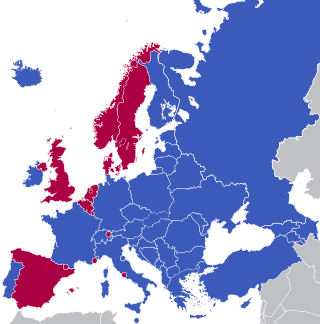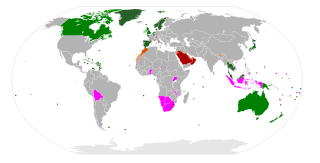
Constitutional monarchy, also known as limited monarchy, parliamentary monarchy or democratic monarchy, is a form of monarchy in which the monarch exercises their authority in accordance with a constitution and is not alone in making decisions. Constitutional monarchies differ from absolute monarchies in that they are bound to exercise powers and authorities within limits prescribed by an established legal framework.
The Left in the European Parliament – GUE/NGL is a left-wing political group of the European Parliament established in 1995. Prior to January 2021 it was named the European United Left/Nordic Green Left.

Euroscepticism, also spelled as Euroskepticism or EU-scepticism, is a political position involving criticism of the European Union (EU) and European integration. It ranges from those who oppose some EU institutions and policies and seek reform, to those who oppose EU membership and see the EU as unreformable. The opposite of Euroscepticism is known as pro-Europeanism.

The Treaty on European Union, commonly known as the Maastricht Treaty, is the foundation treaty of the European Union (EU). Concluded in 1992 between the then-twelve member states of the European Communities, it announced "a new stage in the process of European integration" chiefly in provisions for a shared European citizenship, for the eventual introduction of a single currency, and for common foreign and security policies, and a number of changes to the European institutions and their decision taking procedures, not least a strengthening of the powers of the European Parliament and more majority voting on the Council of Ministers. Although these were seen by many to presage a "federal Europe", key areas remained inter-governmental with national governments collectively taking key decisions. This constitutional debate continued through the negotiation of subsequent treaties, culminating in the 2007 Treaty of Lisbon.

The political history of France covers the history of political movements and systems of government in the nation of France, from the earliest stages of the history of France until the present day. This political history might be considered to start with the formation of the Kingdom of France, and continue until the present day.
A royalist supports a particular monarch as head of state for a particular kingdom, or of a particular dynastic claim. In the abstract, this position is royalism. It is distinct from monarchism, which advocates a monarchical system of government, but not necessarily a particular monarch. Most often, the term royalist is applied to a supporter of a current regime or one that has been recently overthrown to form a republic.

Orléanist was a 19th-century French political label originally used by those who supported a constitutional monarchy expressed by the House of Orléans. Due to the radical political changes that occurred during that century in France, three different phases of Orléanism can be identified:
The abolition of monarchy is a legislative or revolutionary movement to abolish monarchical elements in government, usually hereditary. The abolition of an absolute monarchy in favour of limited government under a constitutional monarchy is a less radical form of anti-monarchism that has succeeded in some nations that still retain monarchs, such as Sweden, Spain, and Thailand.

The French Second Republic, officially the French Republic, was the second republican government of France. It existed from 1848 until its dissolution in 1852.
The Bruges Group is a think tank based in the United Kingdom. Founded in 1989, it advocates for a restructuring of Britain's relationship with the European Union and other European countries. Its members and staff campaign against the notion of an "ever-closer union" in Europe and, above all, against British involvement in a single European state. The group is often associated with the Conservative Party, including MPs such as Iain Duncan Smith, Daniel Hannan, John Redwood, and Norman Lamont. However, it is formally an independent all-party think tank, and some Labour MPs and peers have cited the publications or attended the meetings of the Bruges Group through the years, such as Frank Field, Gisela Stuart, Lord Stoddart of Swindon and Lord Shore of Stepney.
The Movement for France was a conservative Eurosceptic French political party, founded on 20 November 1994, with a marked regional stronghold in the Vendée. It was led by Philippe de Villiers, once communications minister under Jacques Chirac.

The Restoration or Bourbon Restoration was the period in Spanish history between the First Spanish Republic and the Second Spanish Republic from 1874 to 1931. It began on 29 December 1874, after a coup d'état by General Arsenio Martínez Campos ended the First Spanish Republic and restored the monarchy under Alfonso XII, and ended on 14 April 1931 with the proclamation of the Second Spanish Republic.

Radicalism was a political movement representing the leftward flank of liberalism between the late 18th and early 20th century. Certain aspects of the movement were precursors to modern-day movements such as social liberalism, social democracy, civil libertarianism, and modern progressivism. This ideology is commonly referred to as "radicalism" but is sometimes referred to as radical liberalism, or classical radicalism, to distinguish it from radical politics. Its earliest beginnings are to be found during the English Civil War with the Levellers and later the Radical Whigs.

Royal Italy - Star and Crown is a minor Italian political party dedicated to the restoration of the monarchy in Italy, which was abolished in a 1946 referendum. Originally founded as Monarchist Alliance, the party seeks to increase debate amongst the public about the monarchy, and seeks to re-establish a constitutional monarchy through political means.

In the European history, monarchy was the prevalent form of government throughout the Middle Ages, only occasionally competing with communalism, notably in the case of the maritime republics and the Swiss Confederacy.

Georgia has a monarchic tradition that traces its origins to the Hellenistic period. The medieval Kingdom of Georgia ruled by the Bagrationi dynasty has left behind a legacy that lasts in Georgia even in modern times. The qualities and symbols associated with the Bagrationi monarchy have been crucial in the making of the Georgian nation and the subsequent construction of national history. Their rule ended with the annexation of Georgian lands by the Russian Empire early in the 19th century, although several branches of the dynasty survive to this day. The monarchic restoration was considered by various royalist groups throughout the 20th century. Although Georgia's politics has been taking place in the framework of a semi-presidential republic since the nation regained its independence from the Soviet Union in 1991, the debate on monarchy, particularly its constitutional form, has never actually ceased. The issue came up most recently amid a political crisis in late 2007.
Criticism of monarchy has occurred since ancient times. It can be targeted against the general form of government—monarchy—or more specifically, to particular monarchical governments as controlled by hereditary royal families. In some cases, this criticism can be curtailed by legal restrictions and be considered criminal speech, as in lèse-majesté.

Monarchism is the advocacy of the system of monarchy or monarchical rule. A monarchist is an individual who supports this form of government independently of any specific monarch, whereas one who supports a particular monarch is a royalist. Conversely, the opposition to monarchical rule is referred to as republicanism.

Republicanism in Spain is a political position and movement that believes Spain should be a republic.

Georgian Idea was a far-right political party in Georgia. It was founded by Levan Chachua in 2014 and took part in 2016 and 2020 elections, both times missing the electoral threshold to be granted representation in the parliament. In 2024, the leading positions in the party were granted to the members of far-right Alt-Info movement, following their party Conservative Movement being deregistered by Central Election Commission of Georgia. However, on 26 April 2024, prior to the 2024 Georgian parliamentary election, the CEC suspended the electoral registration of the Georgian Idea as well, effectively banning it from the elections, after which both Georgian Idea and Conservative Movement merged with the Alliance of Patriots of Georgia.














